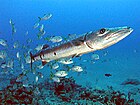Related Research Articles

Fishery can mean either the enterprise of raising or harvesting fish and other aquatic life or, more commonly, the site where such enterprise takes place. Commercial fisheries include wild fisheries and fish farms, both in freshwater waterbodies and the oceans. About 500 million people worldwide are economically dependent on fisheries. 171 million tonnes of fish were produced in 2016, but overfishing is an increasing problem, causing declines in some populations.
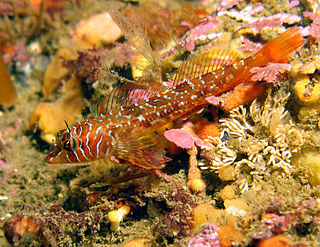
An aquatic animal is any animal, whether vertebrate or invertebrate, that lives in bodies of water for all or most of its lifetime. Aquatic animals generally conduct gas exchange in water by extracting dissolved oxygen via specialised respiratory organs called gills, through the skin or across enteral mucosae, although some are evolved from terrestrial ancestors that re-adapted to aquatic environments, in which case they actually use lungs to breathe air and are essentially holding their breath when living in water. Some species of gastropod mollusc, such as the eastern emerald sea slug, are even capable of kleptoplastic photosynthesis via endosymbiosis with ingested yellow-green algae.

The Global Environment Facility (GEF) is a multilateral environmental fund that provides grants and blended finance for projects related to biodiversity, climate change, international waters, land degradation, persistent organic pollutants (POPs), mercury, sustainable forest management, food security, and sustainable cities in developing countries and countries with economies in transition. It is the largest source of multilateral funding for biodiversity globally and distributes more than $1 billion a year on average to address inter-related environmental challenges.

A conventional idea of a sustainable fishery is that it is one that is harvested at a sustainable rate, where the fish population does not decline over time because of fishing practices. Sustainability in fisheries combines theoretical disciplines, such as the population dynamics of fisheries, with practical strategies, such as avoiding overfishing through techniques such as individual fishing quotas, curtailing destructive and illegal fishing practices by lobbying for appropriate law and policy, setting up protected areas, restoring collapsed fisheries, incorporating all externalities involved in harvesting marine ecosystems into fishery economics, educating stakeholders and the wider public, and developing independent certification programs.
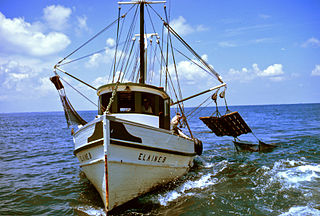
The fishing industry includes any industry or activity that takes, cultures, processes, preserves, stores, transports, markets or sells fish or fish products. It is defined by the Food and Agriculture Organization as including recreational, subsistence and commercial fishing, as well as the related harvesting, processing, and marketing sectors. The commercial activity is aimed at the delivery of fish and other seafood products for human consumption or as input factors in other industrial processes. The livelihood of over 500 million people in developing countries depends directly or indirectly on fisheries and aquaculture.

The goal of fisheries management is to produce sustainable biological, environmental and socioeconomic benefits from renewable aquatic resources. Wild fisheries are classified as renewable when the organisms of interest produce an annual biological surplus that with judicious management can be harvested without reducing future productivity. Fishery management employs activities that protect fishery resources so sustainable exploitation is possible, drawing on fisheries science and possibly including the precautionary principle.
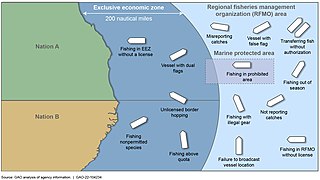
Illegal, unreported and unregulated fishing (IUU) is an issue around the world. Fishing industry observers believe IUU occurs in most fisheries, and accounts for up to 30% of total catches in some important fisheries.
The Joint Ocean Commission Initiative is a bipartisan, collaborative group in the United States that aims to "accelerate the pace of change that results in meaningful ocean policy reform." The Joint Initiative was established by the members of two major U.S.-based oceans commissions: the Pew Oceans Commission and the United States Commission on Ocean Policy. It was originally co-chaired by former White House Chief of Staff Leon Panetta and former Chief of Naval Operations Admiral James D. Watkins, chairs of the Pew and U.S. Ocean Commissions, respectively. Currently, the Joint Initiative is led by a Leadership Council, which is co-chaired by Christine Todd Whitman, former EPA Administrator under President George W. Bush and former governor of New Jersey, and Norman Y. Mineta, Secretary of Commerce under President Bill Clinton and Secretary of Transportation under President George W. Bush.
Sustainability metrics and indices are measures of sustainability, using numbers to quantify environmental, social and economic aspects of the world. There are multiple perspectives on how to measure sustainability as there is no universal standard. Intead, different disciplines and international organizations have offered measures or indicators of how to measure the concept.

The Coral Triangle (CT) is a roughly triangular area in the tropical waters around the Philippines, Indonesia, Malaysia, Papua New Guinea, the Solomon Islands and Timor-Leste. This area contains at least 500 species of reef-building corals in each ecoregion. The Coral Triangle is located between the Pacific and Indian oceans and encompasses portions of two biogeographic regions: the Indonesian-Philippines Region, and the Far Southwestern Pacific Region. As one of eight major coral reef zones in the world, the Coral Triangle is recognized as a global centre of marine biodiversity and a global priority for conservation. Its biological resources make it a global hotspot of marine biodiversity. Known as the "Amazon of the seas", it covers 5.7 million square kilometres (2,200,000 sq mi) of ocean waters. It contains more than 76% of the world's shallow-water reef-building coral species, 37% of its reef fish species, 50% of its razor clam species, six out of seven of the world's sea turtle species, and the world's largest mangrove forest. In 2014, the Asian Development Bank (ADB) reported that the gross domestic product of the marine ecosystem in the Coral Triangle is roughly $1.2 trillion per year and provides food to over 120 million people. According to the Coral Triangle Knowledge Network, the region annually brings in about $3 billion in foreign exchange income from fisheries exports, and another $3 billion from coastal tourism revenues.
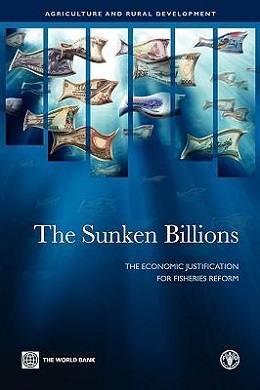
The Sunken Billions is a study jointly published in 2008 by the World Bank and by the Food and Agriculture Organization of the United Nations (FAO). The report shows that the difference between the potential and actual net economic benefits from marine fisheries is about USD 50 billion per year or some USD 2 trillion over the last three decades.
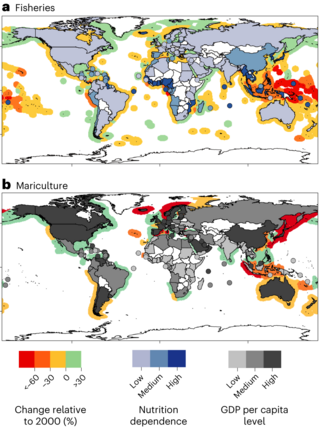
Fisheries are affected by climate change in many ways: marine aquatic ecosystems are being affected by rising ocean temperatures, ocean acidification and ocean deoxygenation, while freshwater ecosystems are being impacted by changes in water temperature, water flow, and fish habitat loss. These effects vary in the context of each fishery. Climate change is modifying fish distributions and the productivity of marine and freshwater species. Climate change is expected to lead to significant changes in the availability and trade of fish products. The geopolitical and economic consequences will be significant, especially for the countries most dependent on the sector. The biggest decreases in maximum catch potential can be expected in the tropics, mostly in the South Pacific regions.

The International Day of Forests was established on the 21st day of March, by resolution of the United Nations General Assembly on November 28, 2013. Each year, various events celebrate and raise awareness of the importance of all types of forests, and trees outside forests, for the benefit of current and future generations. Countries are encouraged to undertake efforts to organize local, national, and international activities involving forests and trees, such as tree planting campaigns, on International Day of Forests. The Secretariat of the United Nations Forum on Forests, in collaboration with the Food and Agriculture Organization, facilitates the implementation of such events in collaboration with governments, the Collaborative Partnership on Forests, and international, regional and subregional organizations. International Day of Forests was observed for the first time on March 21, 2013.
Sustainability standards and certifications are voluntary guidelines used by producers, manufacturers, traders, retailers, and service providers to demonstrate their commitment to good environmental, social, ethical, and food safety practices. There are over 400 such standards across the world.
Ocean governance is the conduct of the policy, actions and affairs regarding the world's oceans. Within governance, it incorporates the influence of non-state actors, i.e. stakeholders, NGOs and so forth, therefore the state is not the only acting power in policy making. However, ocean governance is complex because much of the ocean is a commons that is not ‘owned’ by any single person or nation/state. There is a belief more strongly in the US than other countries that the “invisible hand” is the best method to determine ocean governance factors. These include factors such as what resources we consume, what price we should pay for them, and how we should use them. The underlying reasoning behind this is the market has to have the desire in order to promote environmental protection, however this is rarely the case. This term is referred to as a market failure. Market failures and government failures are the leading causes of ocean governance complications. As a result, humankind has tended to overexploit marine resources, by treating them as shared resources while not taking equal and collective responsibilities in caring for them.

The International Institute for Sustainable Development (IISD) is an independent think tank founded in 1990 working to shape and inform international policy on sustainable development governance. The institute has three offices in Canada - Winnipeg, Ottawa, and Toronto, and one office in Geneva, Switzerland. It has over 150 staff and associates working in over 30 countries.
The Waitt Institute is a non-profit that partners with committed governments and local communities to create and implement sustainable ocean plans to benefit people, the economy, and the environment.

Blue economy is a term in economics relating to the exploitation, preservation and regeneration of the marine environment. Its scope of interpretation varies among organizations. However, the term is generally used in the scope of international development when describing a sustainable development approach to coastal resources. This can include a wide range of economic sectors, from the more conventional fisheries, aquaculture, maritime transport, coastal, marine and maritime tourism, or other traditional uses, to more emergent activities such as coastal renewable energy, marine ecosystem services, seabed mining, and bioprospecting.
The Coral Triangle Initiative on Coral Reefs, Fisheries, and Food Security (CTI-CFF), or the Coral Triangle Initiative (CTI), is a multilateral collaborative partnership among six countries. Partners work together to sustain living marine and coastal resources by addressing crucial issues such as food security, climate change, and marine biodiversity.
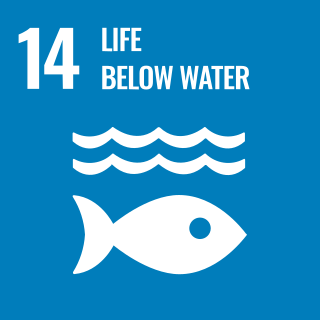
Sustainable Development Goal 14 is about "Life below water" and is one of the 17 Sustainable Development Goals established by the United Nations in 2015. The official wording is to "Conserve and sustainably use the oceans, seas and marine resources for sustainable development". The Goal has ten targets to be achieved by 2030. Progress towards each target is being measured with one indicator each.
References
- 1 2 Global Program on Fisheries (PROFISH) [ permanent dead link ] – World Bank.
- ↑ PROBLUE Annual Report 2019.
- ↑ WSSD's goals in fisheries Archived 2010-01-19 at the Wayback Machine
- 1 2 The Sunken Billions - The Economic Justification for Fisheries Reform Archived 2010-05-04 at the Library of Congress Web Archives – joint publication by the World Bank and the FAO
